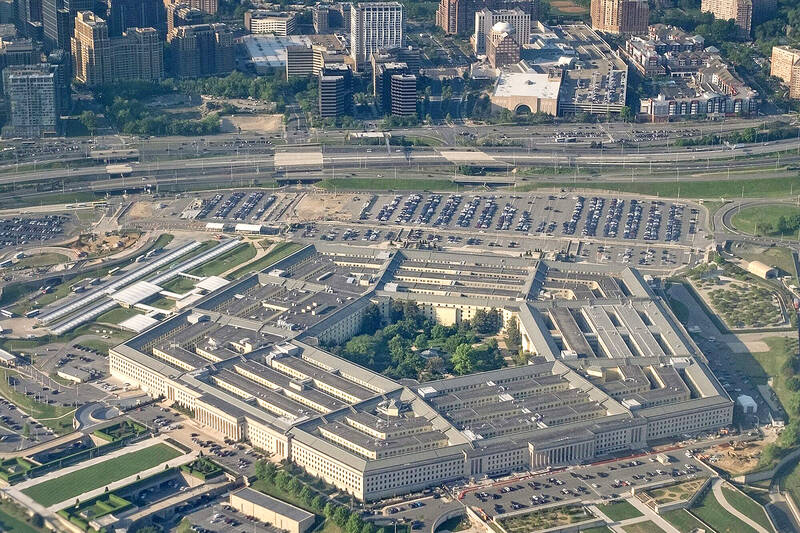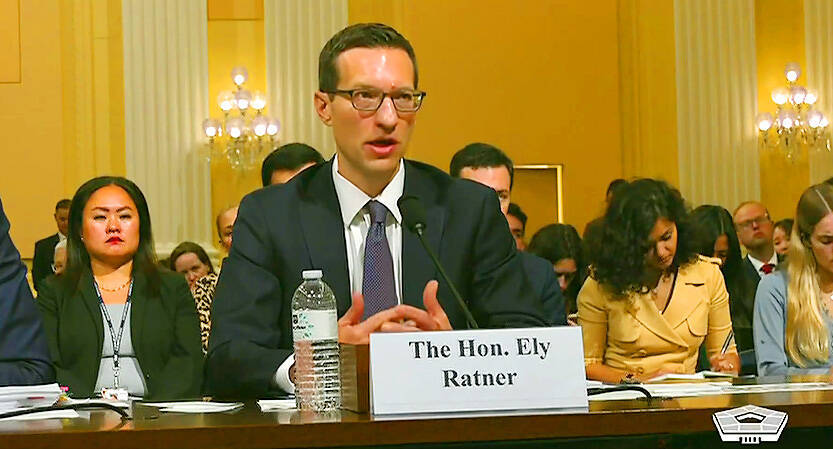A Chinese blockade of Taiwan would be a “monster risk” for Beijing and likely to fail, while a military invasion would be extremely difficult, senior Pentagon officials told the US Congress on Tuesday.
Growing worries of a conflict come as China has ramped up military pressure on Taiwan, holding large-scale war games simulating a blockade on the nation, while conducting near-daily warplane incursions and sending Chinese vessels around its waters.
US Assistant Secretary of Defense for Indo-Pacific Security Affairs Ely Ratner said a blockade would be “a monster risk for the PRC [People’s Republic of China].”

Photo: Bloomberg
“It would likely not succeed, and it would be a huge risk of escalation for the PRC, where it would likely have to consider whether or not it was willing to ultimately start attacking commercial maritime vessels,” Ratner told the US House of Representatives Armed Services Committee.
“A blockade would be devastating to the international community and would likely induce the broad-based wide deep response from the international community ... that Beijing would likely be trying to avoid,” he said.
He was echoed by US Army Major General Joseph McGee, a vice director of the Joint Staff.

Photo: Screen grab from a video on the US Department of Defense’s Web site
“It is an option, but it is probably not a highly likely military option... It is much easier to talk about a blockade than actually do a blockade,” McGee said.
“There is absolutely nothing easy about a PLA [Chinese People’s Liberation Army] invasion of Taiwan,” he said, pointing to the nation’s mountainous terrain and the Taiwan Strait separating it from China.
“They would have to mass tens of thousands, maybe hundreds of thousands of troops on the eastern coast, and that would be a clear signal,” McGee said, adding that combined amphibious and airborne air assault operations would be “an extremely complicated joint operation.”
“That would leave them in that [Taiwan Strait] gap, 90 to 100 miles [145km to 161km] — that would lead them susceptible to all the fire that could be brought to an invading force that was already telegraphing their intentions,” he said.
China’s latest massive show of force came on Monday, when Beijing sent more than 100 warplanes in 24 hours around the nation, prompting Taipei to decry its “destructive unilateral actions.”
Also during Tuesday’s hearing, Mira Resnick, US deputy assistant secretary of state for regional security in the Bureau of Political-Military Affairs, said a US government shutdown could affect foreign weapons sales and licenses to its allies, including Taiwan.
“This is something we would like to avoid,” Resnick said.
Her comments come as the US is less than two weeks from a potential government shutdown, as lawmakers struggle to agree on a short-term spending bill — an impasse that could also have repercussions on military and humanitarian aid to Ukraine.
Resnick said that in the past, the bureau had been unable to process new licenses or new military sales for any partner, including Taiwan, during a shutdown, except in an emergency.
Additional reporting by Reuters

AIR SUPPORT: The Ministry of National Defense thanked the US for the delivery, adding that it was an indicator of the White House’s commitment to the Taiwan Relations Act Deputy Minister of National Defense Po Horng-huei (柏鴻輝) and Representative to the US Alexander Yui on Friday attended a delivery ceremony for the first of Taiwan’s long-awaited 66 F-16C/D Block 70 jets at a Lockheed Martin Corp factory in Greenville, South Carolina. “We are so proud to be the global home of the F-16 and to support Taiwan’s air defense capabilities,” US Representative William Timmons wrote on X, alongside a photograph of Taiwanese and US officials at the event. The F-16C/D Block 70 jets Taiwan ordered have the same capabilities as aircraft that had been upgraded to F-16Vs. The batch of Lockheed Martin

GRIDLOCK: The National Fire Agency’s Special Search and Rescue team is on standby to travel to the countries to help out with the rescue effort A powerful earthquake rocked Myanmar and neighboring Thailand yesterday, killing at least three people in Bangkok and burying dozens when a high-rise building under construction collapsed. Footage shared on social media from Myanmar’s second-largest city showed widespread destruction, raising fears that many were trapped under the rubble or killed. The magnitude 7.7 earthquake, with an epicenter near Mandalay in Myanmar, struck at midday and was followed by a strong magnitude 6.4 aftershock. The extent of death, injury and destruction — especially in Myanmar, which is embroiled in a civil war and where information is tightly controlled at the best of times —

Taiwan was ranked the fourth-safest country in the world with a score of 82.9, trailing only Andorra, the United Arab Emirates and Qatar in Numbeo’s Safety Index by Country report. Taiwan’s score improved by 0.1 points compared with last year’s mid-year report, which had Taiwan fourth with a score of 82.8. However, both scores were lower than in last year’s first review, when Taiwan scored 83.3, and are a long way from when Taiwan was named the second-safest country in the world in 2021, scoring 84.8. Taiwan ranked higher than Singapore in ninth with a score of 77.4 and Japan in 10th with

SECURITY RISK: If there is a conflict between China and Taiwan, ‘there would likely be significant consequences to global economic and security interests,’ it said China remains the top military and cyber threat to the US and continues to make progress on capabilities to seize Taiwan, a report by US intelligence agencies said on Tuesday. The report provides an overview of the “collective insights” of top US intelligence agencies about the security threats to the US posed by foreign nations and criminal organizations. In its Annual Threat Assessment, the agencies divided threats facing the US into two broad categories, “nonstate transnational criminals and terrorists” and “major state actors,” with China, Russia, Iran and North Korea named. Of those countries, “China presents the most comprehensive and robust military threat